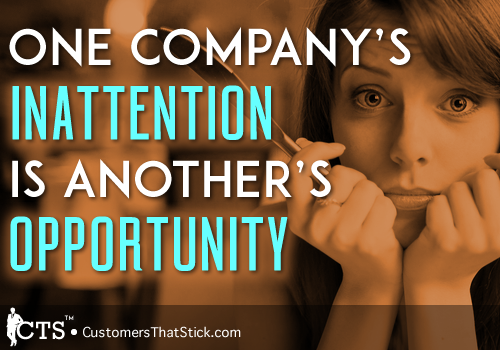A few weeks ago, I stopped by a big box electronics store to make a quick purchase. I had dropped my wife at an appointment and decided to run a few errands until she was done. In this brief trip, I was reminded of how damaging it can be to ignore customers.
 I was shopping for a Bluetooth speaker system. I had purchased a larger set of Bluetooth speakers two years ago, as we wanted something loud enough to be used in the back yard. Unfortunately, the speakers I bought were the opposite of hassle-free, requiring a convoluted login and sync process using a computer. The settings never seemed to stick and the speakers have lain on a closet shelf for awhile now.
I was shopping for a Bluetooth speaker system. I had purchased a larger set of Bluetooth speakers two years ago, as we wanted something loud enough to be used in the back yard. Unfortunately, the speakers I bought were the opposite of hassle-free, requiring a convoluted login and sync process using a computer. The settings never seemed to stick and the speakers have lain on a closet shelf for awhile now.
It was a bad purchase. Bluetooth should be plug and play, much like the cheap Bluetooth speaker I bought for about $15 one day and which has been nothing but a pleasure to use.
So, I was in the market for something in between: small speakers, that were plug and play, but that were powerful enough to cover the garage or backyard.
When a Customer Walks Aimlessly, Does He Make a Sound?
The store had lots of options, and it was obvious that thought had been put into the interactive displays. About two-thirds of the speakers for sale had displays that allowed you to hear how they sounded.
After testing a few speakers, I had narrowed down my choices and had a few questions for the staff. I looked around for a sales associate, but the few I saw were busy with other customers. I walked around playing with the speakers for about five minutes, keeping an eagle eye out for store staff.
I eventually went on the hunt and found two store associates at a help desk of sorts, but they had lines they were managing, so I figured I’d kill some time in another department and then come back. When I came back, I still couldn’t find anyone.
I went back to the help desk, and this time I was able to grab an associate. He offered to “get someone” for me, and I watched as he found another associate and said something to him. He then went back to his computer without saying anything to me.
Not…
“Jim will be right with you.”
Or
“It should be just a few minutes; he’s helping another customer.”
Nothing.
As the minutes passed, I watched the sales associate that was supposed to help me, finish with his customer and then disappear to another part of the store!
At this point, I was starting to get annoyed, so I figured I’d look the model number up online to see if I could find the answer to my question. Lo and behold, the first result was from Amazon, which had the item 20% cheaper.
Within a few seconds of me going online, my wife texted me that she was ready to be picked up.
So, I walked out of the store without purchasing any speakers.
Don’t Cede Your Best Advantage
The staff’s inattention resulted in a number of negative ramifications for the company:
- They lost the sale. I bought my speakers elsewhere.
- I now know that it is a coin toss whether or not I can get the service I need quickly. How much less incentivized am I to go into this store when I have a few “quick minutes” than to just go online, get a likely better price, and free delivery? If this experience is what I can expect, what value do they add?
I will still go back to this electronics store, because prior to this experience, I had two experiences that were very good ; however, this type of experience is the kind that pushes customers towards online shopping.
The major problem with what this electronics store did is that it ceded one of the two areas where it still can maintain competitive advantage: person-to-person, face-to-face customer service.
Big box electronics stores can’t compete on convenience or, often, price; however, they still have the advantage of allowing people to touch, see, and hear products and of having knowledgeable human beings who can assist people with their questions and help make the sale in store.
When they drop the ball on personal customer service, they truly do become “Amazon’s showroom.”



